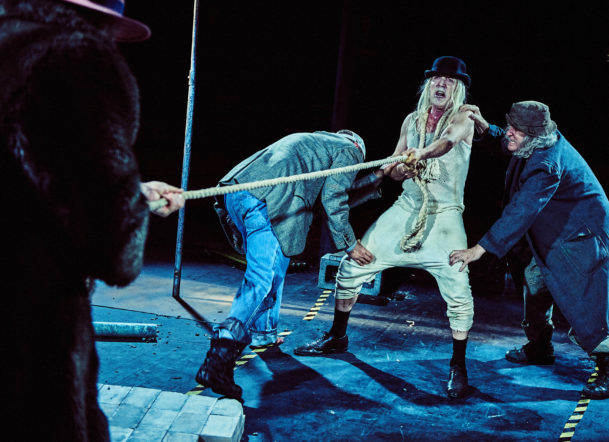
“Behind this veil of peace, night is charging and will burst upon us.”
“They give birth astride of a grave, the light gleams an instant, then it’s night once more.”
“In the immense confusion one thing alone is clear. We are waiting for Godot to come…”
Beckett’s great existential dialogue has been revitalised in this mesmeric and captivating production at Tobacco Factory Theatres. David Fielder and Colin Connor as the two down-and-outs Estragon and Vladimir triumphantly rage and angst their conjoined ways through two hours of ‘nothingness’.
On a minimalist set comprising but a few bricks, a discarded drainpipe, a few aluminium tubes representing a tree and some floor tape indicating a road, Mark Rosenblatt’s direction is a must-see, as the two main protagonists utilise the theatre in the round to full advantage. There was always an intimacy to this performance resonating right through to the rear seats – a sense we could smell the inside of Estragon’s boots!
Attempting to understand Beckett’s writing is akin to learning to appreciate the Higg’s Boson. It’s the dark matter that sometimes counts for more than what’s immediately visible. The beauty of it is that it always holds the big truths without spelling them out, leaving enough chinks for personal interpretation and exploration – vicarious mindfulness perhaps.
Fielder’s consummate grasp of the role of Didi (Vladimir) was exquisite. There was barely a moment one’s eyes left him and his rubber-faced antics. A natural clown, he could veer from face-slapping worry to whimsical foolery in the space of a few strides. Connor’s Estragon, or Gogo, had the slightly more limited enraged and downtrodden role but infused the room with the massive power of his voice, his wounded ego. In their raw need to banish the terrifying void of their lives, the two wayfarers utterly convinced in their need for each other. “Vladimir: That passed the time. Estragon: It would have passed in any case. Vladimir: Yes, but not so rapidly.”
This deranged pas-de-deux gets crazier still with the astonishing arrival of the grand and haughty Pozzo (John Stahl), driving his be-noosed manservant, Lucky (Chris Bianchi), before him. Lucky has long since given up his personal freedom for some sort of perverted security with his bullying and overbearing master. Bianchi delivers up a sorry, waif-like being, yet evokes an ovation for his babbling tirade when ordered to ‘think’ by Pozzo. Even the commanding Pozzo, it seems, needs to qualify his existence with others to survive: “From the meanest creature one departs wiser, richer, more conscious of one’s blessings. Even you, who knows, will have added to my store.”
Godot, to the end, remains an enigma. His existence is seemingly made more likely by the arrival of a boy, played with great confidence in this performance by Freddie Brown, who claims to work for him. But as with everything else in the play, meaning is mercurial, snatches of reality turn into vapours. Our men are none the wiser, and continue to cling to hope and each other’s company in the face of obliteration and meaninglessness. ★★★★★ Simon Bishop 24th October 2017
Pictures by Mark Dawson Photography

